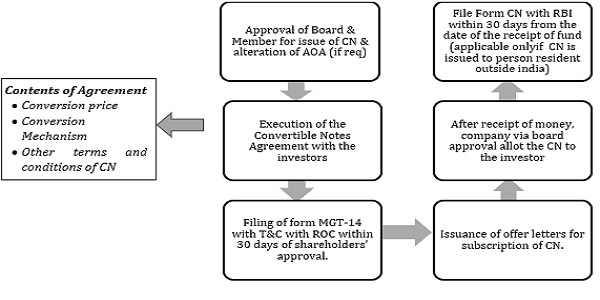Explore the benefits of Convertible Notes (CN) as a flexible funding option for startups. Learn about the DPIIT registration process and conditions for issuing CNs, providing valuable insights for emerging companies seeking innovative funding solutions.
Startups often face challenges in securing funding, and one innovative solution that has gained popularity is the Convertible Note (CN). CN serves as a flexible financial instrument that combines elements of debt and equity, providing a unique funding option for emerging companies.
Convertible Note is an instrument evidencing receipt of money initially as a debt, which is-
- repayable at the option of the holder within 10 years
- convertible into equity shares of the start-up company
upon occurrence of specified events and as per the other terms and conditions agreed to and indicated in the instrument.
Conditions to Issue Convertible Note:
> The company that wants to issue CN should be registered under with DPIIT.
> Minimum amount to be invested in one tranche by one investor is Rs 25 lakhs.
> Can be issued by private limited companies only.
Process for DPIIT Registration:
Registering with DPIIT is a crucial step for startups seeking to issue CNs. Here is a step-by-step guide:
1. Your entity (Private Company or LLP) can be registered as startup india through online portal.
2. Visit the Startup India website and click on ‘Register’.
3. Enter your Name, Email, Mobile No, Password and click on “Register” button.
4. Next, enter the OTP which is sent to your email and fill in the required details, click on the ‘Submit’ button. After this your Startup profile is created.
5. Once, your profile is created on the website, Startup can apply to Department for Promotion of Industry and Internal Trade (DPIIT) for the recognition.
6. Fill in the Start-up Recognition Form and submit along with necessary documents, kindly note that there is no fees for startup registration.
7. List of documents required:
- Certificate of Incorporation
- Proof of funding, if any (PAS-3 / List of allottees)
- Authorisation letter of the authorised representative of entity
- Proof of concept like pitch deck/website link/video
- Patent and trademark details (if any)
- List of awards or certificates of recognition (if any)
8. Once the duly filled application is made then the Certificate of recognition will be issued after due examination of the documents submitted.
9. The Certificate of recognition will be valid up to ten years from the date of its incorporation or till the turnover for any of the financial years exceed 100 Crores whichever is earlier.
Specified entities are not eligible for being registered as Startup.
Procedure for Issue of Convertible Note (CN):
When the CN’s tenure expires, it can be converted into equity shares. The conversion process involves several steps:
 CONVERSION OF CN INTO SHARES:
CONVERSION OF CN INTO SHARES:
After the expiry of tenure of CN, Startup convert the CN into equity shares of the company at the conversion price agreed upon, for which:
> Board approval is required for allotment of equity shares.
> Filing of form PAS-3(Return of allotment) to registrar of companies, within 30 days of allotment.
> Lastly issuance of share certificate and updation of register of members.
Advantages of Convertible Note (CN):
√ CN can be issued to foreign investors subject to Foreign Exchange Management Act 1999 regulations, NRIs, Resident Indians, Indian companies.
√ Can be treated as exempted deposits under the Companies Act 2013.
√ Flexibility to conduct valuation either at the time of issuance of CN or at the time of conversion of CN into shares.
Conclusion: Convertible Notes (CNs) provide startups with a valuable funding option that combines debt and equity elements. By meeting the necessary conditions and going through the DPIIT registration process, startups can tap into this flexible source of funding and potentially attract a diverse range of investors. Additionally, the conversion process allows for the transition of CNs into equity shares, further enhancing the financial structure of the company. Consider exploring CNs as part of your startup’s funding strategy to fuel your growth and innovation.




